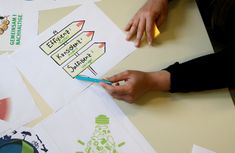Call for Abstracts
Call for Abstracts: The symposium aims to contribute to consumer research related to (environmental, social and economic) sustainability and sufficiency lifestyles, as well as approaches to economic forms and business models that contribute to sufficiency lifestyles. For this purpose, we invite submissions on the following topics: reduction and sufficiency, sufficiency-like lifestyles such as Voluntary Simplicity, Minimalism and others, as well as degrowth and postgrowth. Related aspects from different disciplines and perspectives are also welcome.
On the topic of the event:
The concept of sufficiency poses the question of "the right amount" or "a sufficient amount of something" (Princen, 2005). The idea of moderation is not new. Moderation can be seen as a virtue (religions, ethics), modern philosophers and sociologists consider it as a way to live a good life (e.g. Rosa, 2016) and some consumers* see it as a freely chosen strategy towards more independence and self-determination (e.g. Rebouças & Soares, 2020). The voluntary restriction of consumption, possessions or working time and thus income (described in concepts such as Voluntary Simplicity, Minimalism, Downshifting) can so far be seen as a niche phenomenon. If sufficiency is to become a generally desired norm at the societal level beyond individual decisions, then corresponding institutional, political (e.g., incentives and prohibitions) and macroeconomic (e.g., emergence of adequate economic forms and alternative indicators of prosperity) framework conditions are needed. These are important topics that require a holistic and interdisciplinary approach. This year's symposium is also intended to contribute to the interdisciplinary debate on whether and how sufficiency-oriented lifestyles are sustainable in the sense of sustainable development.
Participation & Venue:
Participation in the 2-day symposium is free of charge. Registration is possible from 1.06. until 15.09.2022 at the latest at https://boku.ac.at/wiso/mi/5-symposium-konsum-neu-denken
Venue: University of Natural Resources and Life Sciences, Ilse Wallentin Haus, Peter Jordan Straße 82, 1190 Vienna, https://boku.ac.at/
Call for Abstracts:
Please submit scientific contributions in the form of extended abstracts (length max. 2 A4 pages, including contact details, the title of the paper and DeepL description) on these and related topics via the conference website https://boku.ac.at/wiso/mi/5-symposium-konsum-neu-denken by May 15, 2022 at the latest. PhD students and early career researchers* are explicitly invited to submit papers.
In addition to contributions on the exemplary questions below, contributions on aspects and topics not explicitly mentioned are also welcome.
Possible questions:
(1) What is the (historical, current and future) significance of consumption reduction as a social phenomenon?
(2) Which preconditions are necessary for sufficiency-oriented lifestyles (e.g. income distribution, societal values, personal attitudes, institutional support, etc.)? Which institutional framework conditions as well as individual and social factors support the establishment of sufficiency lifestyles?
(3) What is the everyday life of people who already choose sufficiency lifestyles? What are the barriers and obstacles to the implementation of sufficiency lifestyles?
(4) How are sufficiency lifestyles related to quality of life and well-being?
(5) What contribution can sufficiency make to environmental and climate protection, individual quality of life, and a just society or world?
(6) Are there innovative corporate or marketing models for promoting sufficiency consumption or sufficiency use? Which problem areas exist?
(7) What are possible communication strategies to make people aware of sufficiency? What are the foundations for sufficiency communication?
(8) What are the economic consequences of establishing sufficiency lifestyles in society? What does sufficiency mean for markets and for the measurement of economic performance and growth? Which degrowth concepts are sustainable?
(9) Is sufficiency economically feasible in a global economic system? Under what conditions? In which time horizon?
(10) What are useful and meaningful indicators to measure sufficiency?
(11) What are the problematic consequences of sufficiency consumption societies? Which downsides, rebound effects, and countermovements can be expected?
(12) Is sufficiency a globally applicable concept? What are the ethical and moral concerns and obstacles?
(13) What contribution can plural, student- and lifeworld-oriented economic and consumer education make to the topic of sufficiency and sufficiency-oriented lifestyles in school contexts?
(14) How can teachers and students be sensitized to this topic without moralizing, and how can they be supported by a corresponding economic education in self-selected sufficiency lifestyles?
For all the latest information on the event and the full Call for Abstracts, please visit: https://boku.ac.at/wiso/mi/5-symposium-konsum-neu-denken
For PhD students there is the possibility of a travel grant if needed, please contact suffizienz-symposium@boku.ac.at for this.

